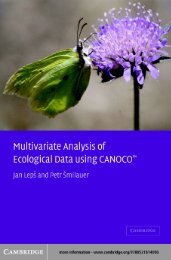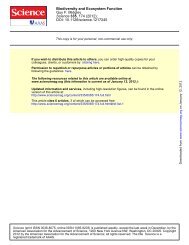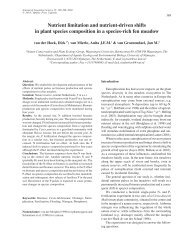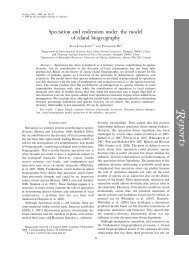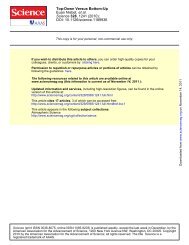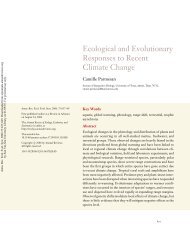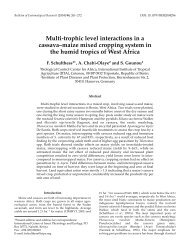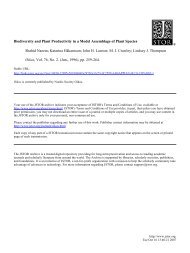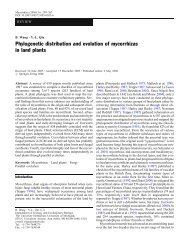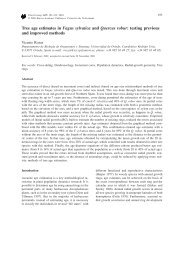Welcome to the 31st IUBS General Assembly and Conference on ...
Welcome to the 31st IUBS General Assembly and Conference on ...
Welcome to the 31st IUBS General Assembly and Conference on ...
You also want an ePaper? Increase the reach of your titles
YUMPU automatically turns print PDFs into web optimized ePapers that Google loves.
Department of Integrative Biology <str<strong>on</strong>g>and</str<strong>on</strong>g> Museum of Vertebrate<br />
Zoology, University of California, Berkeley, CA 94720‐3140,<br />
USA. Email: mhwake@berkeley.edu<br />
physiological resp<strong>on</strong>ses <str<strong>on</strong>g>to</str<strong>on</strong>g> climate change<br />
Sim<strong>on</strong> MORLEY<br />
C<strong>on</strong>servati<strong>on</strong> biology <str<strong>on</strong>g>and</str<strong>on</strong>g> evoluti<strong>on</strong>, <str<strong>on</strong>g>and</str<strong>on</strong>g> <str<strong>on</strong>g>the</str<strong>on</strong>g> implicati<strong>on</strong>s<br />
for both of global climate change, are major c<strong>on</strong>cerns of<br />
<str<strong>on</strong>g>IUBS</str<strong>on</strong>g>. One of our missi<strong>on</strong>s is <str<strong>on</strong>g>to</str<strong>on</strong>g> develop <str<strong>on</strong>g>and</str<strong>on</strong>g> present <str<strong>on</strong>g>the</str<strong>on</strong>g><br />
science involved in <str<strong>on</strong>g>the</str<strong>on</strong>g>se issues, <str<strong>on</strong>g>and</str<strong>on</strong>g> <str<strong>on</strong>g>to</str<strong>on</strong>g> educate scientists,<br />
students, <str<strong>on</strong>g>the</str<strong>on</strong>g> public at large, <str<strong>on</strong>g>and</str<strong>on</strong>g> policy makers about<br />
<str<strong>on</strong>g>the</str<strong>on</strong>g>se <str<strong>on</strong>g>to</str<strong>on</strong>g>pics. Educati<strong>on</strong> programs <str<strong>on</strong>g>and</str<strong>on</strong>g> <str<strong>on</strong>g>to</str<strong>on</strong>g>ols are being<br />
developed that focus <strong>on</strong> <str<strong>on</strong>g>the</str<strong>on</strong>g>m, but <str<strong>on</strong>g>the</str<strong>on</strong>g>re is a more<br />
fundamental problem that must be dealt with as well.<br />
Given <str<strong>on</strong>g>the</str<strong>on</strong>g> impact of science <strong>on</strong> society, <str<strong>on</strong>g>the</str<strong>on</strong>g> lack of public<br />
underst<str<strong>on</strong>g>and</str<strong>on</strong>g>ing of science is a grave c<strong>on</strong>cern. In large part,<br />
<str<strong>on</strong>g>the</str<strong>on</strong>g> current c<strong>on</strong>fusi<strong>on</strong>s about evoluti<strong>on</strong>, global warming,<br />
<str<strong>on</strong>g>and</str<strong>on</strong>g> o<str<strong>on</strong>g>the</str<strong>on</strong>g>r aspects of science are symp<str<strong>on</strong>g>to</str<strong>on</strong>g>matic of a<br />
general misunderst<str<strong>on</strong>g>and</str<strong>on</strong>g>ing of what science is <str<strong>on</strong>g>and</str<strong>on</strong>g> what it<br />
is not. Science is rarely c<strong>on</strong>sidered a dynamic process<br />
through which we gain a reliable underst<str<strong>on</strong>g>and</str<strong>on</strong>g>ing of <str<strong>on</strong>g>the</str<strong>on</strong>g><br />
natural world. As a result, <str<strong>on</strong>g>the</str<strong>on</strong>g> public becomes vulnerable<br />
<str<strong>on</strong>g>to</str<strong>on</strong>g> misinformati<strong>on</strong> <str<strong>on</strong>g>and</str<strong>on</strong>g> <str<strong>on</strong>g>the</str<strong>on</strong>g> benefits of science become<br />
obscured. The problem is particularly difficult in <str<strong>on</strong>g>the</str<strong>on</strong>g> US.<br />
However, efforts are being made <str<strong>on</strong>g>to</str<strong>on</strong>g> develop resp<strong>on</strong>sible<br />
educati<strong>on</strong> methods <str<strong>on</strong>g>and</str<strong>on</strong>g> <str<strong>on</strong>g>to</str<strong>on</strong>g>ols. An example is an<br />
NSF‐funded initiative <str<strong>on</strong>g>to</str<strong>on</strong>g> improve public underst<str<strong>on</strong>g>and</str<strong>on</strong>g>ing<br />
about how science works, why it matters, <str<strong>on</strong>g>and</str<strong>on</strong>g> who<br />
scientists are. Underst<str<strong>on</strong>g>and</str<strong>on</strong>g>ing Science is a collaborative<br />
project, developed by <str<strong>on</strong>g>the</str<strong>on</strong>g> University of California,<br />
Berkeley, Museum of Pale<strong>on</strong><str<strong>on</strong>g>to</str<strong>on</strong>g>logy. It includes <str<strong>on</strong>g>the</str<strong>on</strong>g><br />
creative aspects of scientific research, <str<strong>on</strong>g>the</str<strong>on</strong>g> influence <str<strong>on</strong>g>and</str<strong>on</strong>g><br />
diversity of <str<strong>on</strong>g>the</str<strong>on</strong>g> scientific community, <str<strong>on</strong>g>the</str<strong>on</strong>g> applicati<strong>on</strong>s,<br />
<str<strong>on</strong>g>the</str<strong>on</strong>g> joys, <str<strong>on</strong>g>and</str<strong>on</strong>g> even <str<strong>on</strong>g>the</str<strong>on</strong>g> frustrati<strong>on</strong>s. It is web‐based, <str<strong>on</strong>g>and</str<strong>on</strong>g><br />
includes materials appropriate <str<strong>on</strong>g>to</str<strong>on</strong>g> kindergarten through<br />
undergraduate college students (<str<strong>on</strong>g>and</str<strong>on</strong>g> teachers!!), as well<br />
as <str<strong>on</strong>g>the</str<strong>on</strong>g> lay public. It facilitates critical assessment of<br />
c<strong>on</strong>flicting representati<strong>on</strong>s of scientific evidence in <str<strong>on</strong>g>the</str<strong>on</strong>g><br />
media. Materials have been translated in<str<strong>on</strong>g>to</str<strong>on</strong>g> many<br />
languages. Underst<str<strong>on</strong>g>and</str<strong>on</strong>g>ing Science, Underst<str<strong>on</strong>g>and</str<strong>on</strong>g>ing<br />
Evoluti<strong>on</strong>, <str<strong>on</strong>g>and</str<strong>on</strong>g> <str<strong>on</strong>g>the</str<strong>on</strong>g> Underst<str<strong>on</strong>g>and</str<strong>on</strong>g>ing Climate Change<br />
program currently in development are designed <str<strong>on</strong>g>to</str<strong>on</strong>g><br />
provide <str<strong>on</strong>g>the</str<strong>on</strong>g> resources appropriate <str<strong>on</strong>g>to</str<strong>on</strong>g> underst<str<strong>on</strong>g>and</str<strong>on</strong>g>ing<br />
science <str<strong>on</strong>g>and</str<strong>on</strong>g> its applicati<strong>on</strong> <str<strong>on</strong>g>to</str<strong>on</strong>g> such issues as c<strong>on</strong>servati<strong>on</strong><br />
<str<strong>on</strong>g>and</str<strong>on</strong>g> climate change.<br />
Using regi<strong>on</strong>s where biodiversity <str<strong>on</strong>g>and</str<strong>on</strong>g> ocean<br />
warming hotspots overlap <str<strong>on</strong>g>to</str<strong>on</strong>g> predict<br />
British Antarctic Survey, High Cross, Madingley Road,<br />
Cambridge, Cambridgeshire CB30ET, UK. Email:<br />
smor@bas.ac.uk<br />
Underst<str<strong>on</strong>g>and</str<strong>on</strong>g>ing <str<strong>on</strong>g>the</str<strong>on</strong>g> resp<strong>on</strong>ses of organisms <str<strong>on</strong>g>to</str<strong>on</strong>g><br />
envir<strong>on</strong>mental variability is crucial <str<strong>on</strong>g>to</str<strong>on</strong>g> our ability <str<strong>on</strong>g>to</str<strong>on</strong>g><br />
predict <str<strong>on</strong>g>the</str<strong>on</strong>g> global redistributi<strong>on</strong> of biodiversity under<br />
climate change. Both mean <str<strong>on</strong>g>and</str<strong>on</strong>g> extreme temperatures<br />
are increasing causing <str<strong>on</strong>g>the</str<strong>on</strong>g> geographic ranges of species<br />
<str<strong>on</strong>g>to</str<strong>on</strong>g> move polewards. Regi<strong>on</strong>s with <str<strong>on</strong>g>the</str<strong>on</strong>g> most rapid<br />
warming, <str<strong>on</strong>g>the</str<strong>on</strong>g>refore, present an opportunity <str<strong>on</strong>g>to</str<strong>on</strong>g> quickly<br />
advance our underst<str<strong>on</strong>g>and</str<strong>on</strong>g>ing of current <str<strong>on</strong>g>and</str<strong>on</strong>g> likely future<br />
changes. The sub‐Antarctic isl<str<strong>on</strong>g>and</str<strong>on</strong>g> of South Georgia is<br />
<strong>on</strong>e such ocean warming hotspot. S. Georgia is also<br />
geographically isolated, 1000 km from <str<strong>on</strong>g>the</str<strong>on</strong>g> nearest l<str<strong>on</strong>g>and</str<strong>on</strong>g>,<br />
<str<strong>on</strong>g>and</str<strong>on</strong>g> whilst <str<strong>on</strong>g>the</str<strong>on</strong>g> marine fauna is predominately Antarctic,<br />
with high levels of endemism, currents also supply larvae<br />
from north of polar fr<strong>on</strong>t. This leads <str<strong>on</strong>g>to</str<strong>on</strong>g> <str<strong>on</strong>g>the</str<strong>on</strong>g> isl<str<strong>on</strong>g>and</str<strong>on</strong>g> being a<br />
biodiversity hotspot <str<strong>on</strong>g>and</str<strong>on</strong>g> regi<strong>on</strong> where both <str<strong>on</strong>g>the</str<strong>on</strong>g><br />
equa<str<strong>on</strong>g>to</str<strong>on</strong>g>rward <str<strong>on</strong>g>and</str<strong>on</strong>g> poleward range limits overlap.<br />
With its positi<strong>on</strong> at <str<strong>on</strong>g>the</str<strong>on</strong>g> nor<str<strong>on</strong>g>the</str<strong>on</strong>g>rn edge of <str<strong>on</strong>g>the</str<strong>on</strong>g> Sou<str<strong>on</strong>g>the</str<strong>on</strong>g>rn<br />
Ocean S. Georgia already experiences <str<strong>on</strong>g>the</str<strong>on</strong>g> warmest<br />
maximum sea surface temperatures (SST), <str<strong>on</strong>g>and</str<strong>on</strong>g> <str<strong>on</strong>g>the</str<strong>on</strong>g><br />
widest annual SST range within <str<strong>on</strong>g>the</str<strong>on</strong>g> Sou<str<strong>on</strong>g>the</str<strong>on</strong>g>rn Ocean.<br />
The summer SST at S. Georgia is above <str<strong>on</strong>g>the</str<strong>on</strong>g> measured<br />
physiological limits of many of <str<strong>on</strong>g>the</str<strong>on</strong>g> co‐occurring species<br />
from fur<str<strong>on</strong>g>the</str<strong>on</strong>g>r south <strong>on</strong> <str<strong>on</strong>g>the</str<strong>on</strong>g> Antarctic Peninsula. To cope<br />
with <str<strong>on</strong>g>the</str<strong>on</strong>g> warmer envir<strong>on</strong>ment at S. Georgia some of<br />
<str<strong>on</strong>g>the</str<strong>on</strong>g>se co‐occurring species have altered depth<br />
distributi<strong>on</strong>s at S. Georgia, <str<strong>on</strong>g>to</str<strong>on</strong>g> avoid <str<strong>on</strong>g>the</str<strong>on</strong>g> warmest water<br />
masses, <str<strong>on</strong>g>and</str<strong>on</strong>g> have greater physiological plasticity <str<strong>on</strong>g>to</str<strong>on</strong>g> cope<br />
with <str<strong>on</strong>g>the</str<strong>on</strong>g> more variable <str<strong>on</strong>g>the</str<strong>on</strong>g>rmal c<strong>on</strong>diti<strong>on</strong>s.<br />
Underst<str<strong>on</strong>g>and</str<strong>on</strong>g>ing how gene flow <str<strong>on</strong>g>and</str<strong>on</strong>g> adaptati<strong>on</strong> of species<br />
at S. Georgia has affected physiological <str<strong>on</strong>g>to</str<strong>on</strong>g>lerance will<br />
indicate important mechanisms underlying species<br />
geographic ranges in <str<strong>on</strong>g>the</str<strong>on</strong>g> ocean.<br />
What is a cycadophyte? – The use of<br />
morphotaxa in palaeobotany<br />
Christian POTT <str<strong>on</strong>g>and</str<strong>on</strong>g> Stephen McLOUGHLIN<br />
88



